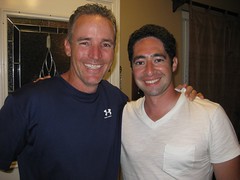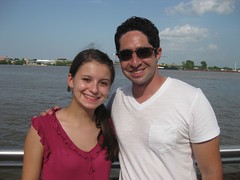Yesterday’s post began with my gratefulness for a great weekend but ended with the concern of a poor attendance because of all the other functions that were falling on that weekend.
Then there was a turning point. A junior girl decided to skip her Homecoming Weekend. Now, to guys like me, i would consider a retreat scheduled on a weekend like this to be a favor but apparently to girls, this was a stressful decision and a major sacrifice. I don’t understand Twilight or Justin Bieber either.
Looking back on it, her decision became quite the message that was communicated to everyone. I heard a few people say, “Wow – that’s cool she’s doing that.” Soon other junior girls signed up, seniors signed up (we have awesome seniors btw), and a handful of students who I did not expect began making the commitment. One skipped her tennis meet (she’s good too), a lead in a school play skipped his Saturday rehearsal and numerous other sacrifices were made and you know what – this commitment became an important message to each other. (What was also cool is that no one intentionally made a big deal of it).
By the end of the weekend, everyone was saying, “I am so glad I came …. I really needed this.” Which for those of us in youth ministry that is the same jubilation felt when a senior pastor hears the phrase “Pastor, we got a big offering today!” (Kidding, Kidding).
The other youth pastor, Greg, and I spent a lot of time talking about the idols we (un)intentionally create in our lives. It ranges from academics, sports, the arts, and numerous other extracurriculars. This stems from being taught at an early age that we are in competition with one another. “Nothing will be handed to you, you need to earn it” and sitting at the kitchen table and hearing a loving and concerned parent explain that scholarships are essential to get into a good school so you can get a good job so you can get a good life and if you don’t, insert the nightmare story here that every family has but rarely shares from behind closed doors. This is the pressure that my classmates and I grew up with and in many ways, it is even more competitive now.
Numerous times a day, I hear the crazy pace of our students – getting up early, after-school practices and rehearsals, jobs and other responsibilities that bring them home around 9 (some later) and then the homework … On the retreat we discussed this at length. Where is the balance that God intends for us? Is it even possible to live a life that is focused on Jesus with such a calendar? Is an idea like Sabbath even practical today?
I know these sentiments may be scary to people, especially to parents (and I write knowing very aware of this and hope you communicate any concerns to me). These sentiments when abused lead to laziness in the name of God which is of course, not godly at all. We as adults, youth pastors, students, anyone who considers themselves a follower of Jesus is called to live out the calling placed on our lives. This always means hard-work, being a good steward of our gifts, personalities, time, resources, etc. we have been entrusted with and our commitment to serving the Father’s Kingdom, because as Jesus said, “What good is it for a person to get a 4.0, a perfect SAT score, a dream job that provides the luxuries and amenities of the world but lose their soul?”

 Like I said, we are all cursed in different ways. Some choose to deny this reality and are completely overtaken by surprise and shock when pain and evil find them. Others accept this and live their lives in such paranoia that they souls are too paralyzed to even enjoy the good days. Obviously a balance would be helpful but that’s only the start. We need hope. We need a real reason to be hopeful.
Like I said, we are all cursed in different ways. Some choose to deny this reality and are completely overtaken by surprise and shock when pain and evil find them. Others accept this and live their lives in such paranoia that they souls are too paralyzed to even enjoy the good days. Obviously a balance would be helpful but that’s only the start. We need hope. We need a real reason to be hopeful.
 I really enjoyed my conversations with The Gathering Team. Had some excellent conversations with Aaron (their community pastor) and got to know Pastor Matt. He told us the story of how he and his family (with two very young children) moved 6 months after Katrina and lived off of generators for 18 months. This decision spoke so much to their new neighbors and community. It’s usually at this point, that the story would say, “And their church sky-rocketed in growth” but instead, they began very non-dramatically seeking intentional relationships and serving the community in any way they could.
I really enjoyed my conversations with The Gathering Team. Had some excellent conversations with Aaron (their community pastor) and got to know Pastor Matt. He told us the story of how he and his family (with two very young children) moved 6 months after Katrina and lived off of generators for 18 months. This decision spoke so much to their new neighbors and community. It’s usually at this point, that the story would say, “And their church sky-rocketed in growth” but instead, they began very non-dramatically seeking intentional relationships and serving the community in any way they could.






Recent Comments